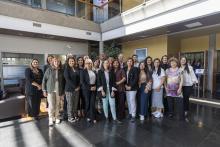Training and certification for the care economy in Latin America and the Caribbean
The II Regional Technical Meeting on vocational training and certification for the care economy was held from 5 to 7 November in Santiago de Chile, co-organised with the Chilean Ministry of Labour and Social Security, SENCE and ChileValora.
The meeting marked an important milestone in the process coordinated by ILO/Cinterfor, with the technical assistance of PARTNERSHIP, together with 18 training and skills certification institutions of the ILO/Cinterfor Network from 14 countries in the region.
At the opening, the Seminar ‘Decent work and care economy: training and certification of labour competencies’, organized by the Ministry of Labour and Social Security of Chile and ILO/Cinterfor, provided a global approach to training and certification, highlighting the Chilean experience in this field.
The opening ceremony was led by the Minister of Labour and Social Security, Janet Jara, who highlighted the relevance of this meeting at a key moment for care policies in Chile and the region. In her speech, Jara mentioned that the growing visibility of care work is due to various factors, including the incorporation of women into the labour market, changes in family structures and progressive demographic ageing. This situation has triggered what is known as the ‘care crisis’, a phenomenon that has placed this sector at the centre of public policies and debates on social equity.
The minister emphasised the importance of the National System of Support and Care ‘Chile Cuida’, a comprehensive public policy that has been promoted since the government of former president Michelle Bachelet and strengthened by the current president Gabriel Boric. This system seeks to coordinate the actions of different ministries, especially the Ministry of Women and Gender Equality and the Ministry of Social Development, with a focus on gender, community and based on care as a human right. Janet Jara stressed the need to provide this policy with adequate resources for its sustainability, pointing out the fiscal challenges in a context of limited budget availability.
Elena Montobbio, Director of ILO/Cinterfor, then gave an overview of the global situation of care and the accelerated changes this sector is facing. Montobbio mentioned shocking data: the care sector employs more than 381 million people in paid employment worldwide, representing 11.5% of global employment, but it is also one of the areas where the most glaring inequalities persist, especially in terms of working conditions and wages. She expressed the urgency of recognising this work as essential, providing it with rights and quality standards to improve the situation of carers and guarantee decent work.
The undersecretaries for Labour, Giorgio Boccardo, and for Women and Gender Equality, Luz Vidal, also took part. Boccardo highlighted the legislative advances that Chile has implemented in recent years, including the gender perspective and work-life balance in the Labour Code, as well as the reduction of the working day to 40 hours. For her part, Vidal called for recognition of the economic and social contribution of caregivers, recalling that many women continue to provide care in precarious conditions and without access to basic rights. She mentioned concrete examples of women who have dedicated their lives to family care, highlighting the need for public policies to alleviate the burden of these workers and to promote greater social co-responsibility.
Afterwards, Sence and Chile Valora shared their progress and challenges. Romanina Morales, director of the National Training and Employment Service (Sence), underlined the importance of training as a tool to empower caregivers. Morales highlighted several actions in relation to the care sector: the creation of specific occupational profiles for the care economy, including training for gerontological and severe dependency caregivers; as well as face-to-face courses in comprehensive basic care services for the elderly. Morales mentioned that Sence promotes a system that allows standardising, evaluating and certifying the labour competencies of caregivers, recognising their previous learning and facilitating their labour market insertion. In addition to training, it also works on labour intermediation, collaborating with municipalities to facilitate the insertion of caregivers in the labour market.
The director of ChileValora, Ximena Rivillo, explained the central role of her institution in the certification of labour competencies, highlighting how the recognition of the work and training trajectories of caregivers contributes to their dignity and employability. ChileValora, Rivillo explained, is a tripartite body that certifies the skills of female workers and provides a solid basis for them to qualify for better working conditions. This effort, she said, not only benefits workers, but also provides companies with the certainty of having trained and competent personnel. In this regard, she highlighted some of the most relevant actions, such as the development of specific labour skills profiles for the care sector, which facilitates the creation of training plans aligned with the needs of the labour market; as well as the joint work with the Ministry of Labour and other institutions to advance in the professionalisation of the care sector, ensuring that training and certification are aligned with social demands.
The meeting also included a panel focused on the vision of caregivers, as well as the institutions that need to hire caregivers. Paola Reyes, leader of the Family Caregivers Foundation, raised several challenges in the context of care, highlighting the need for care work to be made visible and recognised, both in the family and in the workplace, so that caregivers have access to rights and benefits. She pointed out that many women face barriers in accessing education and training due to their care responsibilities, which limits their job opportunities and personal development. Reyes highlighted the importance of redistributing care responsibilities among different actors, including the state and the community, to alleviate the burden that falls primarily on women, and stressed the importance of involving caregivers in the construction of policies and programmes that affect them, ensuring that their voices and experiences are considered in the design of solutions.
Francisca Correa, Director of People at Hogar de Cristo, raised several key points about her organisation's actions in the area of caregiving. She highlighted the importance of certifying caregivers, which not only improves their employability, but also ensures the quality of the care they provide. She mentioned that Hogar de Cristo has adapted its programmes to certify, facilitating their retraining and ensuring that they are prepared for the demands of the market. He highlighted the need to include people with disabilities in the certification process and in the workplace, promoting a culture of inclusion within the organisation. Correa also emphasised the active role that should be played in the discussion of public policies related to care, ensuring that the voices of caregivers are heard in the legislative process.
The event concluded with remarks by Carmen Bueno, ILO officer in charge of the Southern Cone office, calling for action and inviting the exchange of experiences and good practices among the countries of the region. Bueno stressed that the challenge of moving towards a system of social co-responsibility requires strong political will and a solid financial commitment. It was acknowledged that Chile has made significant progress, but much remains to be done to ensure that care work is recognised, formalised and fairly remunerated.
During the following two and a half days, the team, composed of representatives from 17 Network institutions from 13 countries in the region, continued the work on the basis of the regional action plan. The activity included various group work, reflection and debates on the axes of the regional project ‘Strengthening South-South and Triangular Cooperation for the Development of Competencies and Lifelong Learning in the Care Economy’.
As part of the structuring conceptual framework, two outstanding panels were organised with the participation of: Laura Pautassi, from the Latin American Team for Justice and Gender, who spoke about care as a human right - the rights of care workers; Ana Güezmes García, Director of ECLAC's Gender Division, who shared the Regional Gender Agenda and the paradigm of the care society; and Nadya Araújo Guimarães, Professor at the University of São Paulo, who reflected on the challenges of paid care work for the realisation of the 5Rs.
As a result of the meeting, it was possible to strengthen the regional network of specialists, deepen new learning and knowledge, experiences and good practices, as well as to analyse the joint work plan and agree on the next steps to be implemented.






